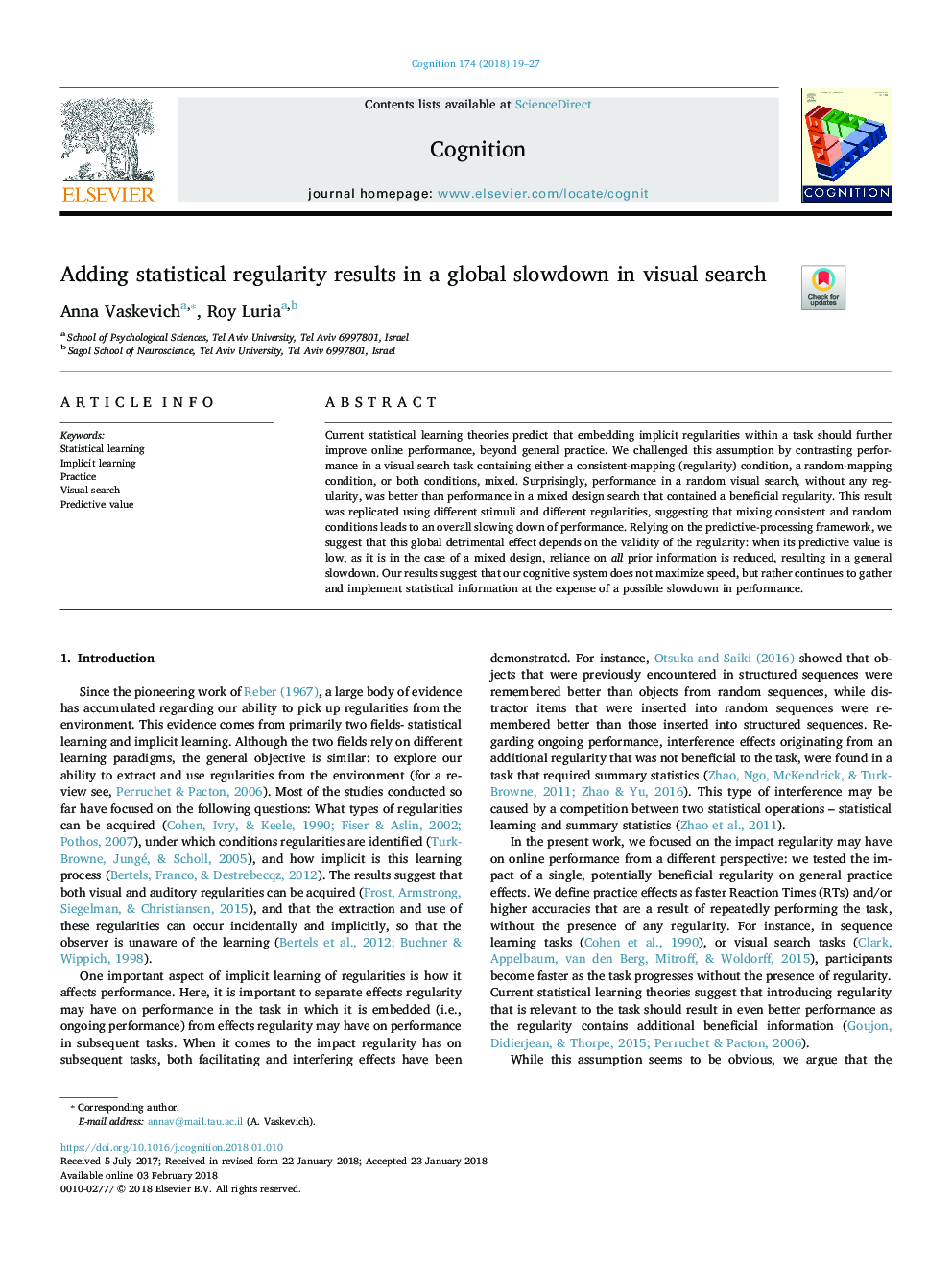| کد مقاله | کد نشریه | سال انتشار | مقاله انگلیسی | نسخه تمام متن |
|---|---|---|---|---|
| 7285386 | 1474093 | 2018 | 9 صفحه PDF | دانلود رایگان |
عنوان انگلیسی مقاله ISI
Adding statistical regularity results in a global slowdown in visual search
ترجمه فارسی عنوان
اضافه کردن نتایج منظم آماری در کاهش سرعت جهانی در جستجوی بصری
دانلود مقاله + سفارش ترجمه
دانلود مقاله ISI انگلیسی
رایگان برای ایرانیان
کلمات کلیدی
یادگیری آماری، یادگیری نامتجانس، تمرین، جستجوی ویژوال ارزش پیش بینی کننده،
ترجمه چکیده
نظریه های یادگیری آماری در حال حاضر پیش بینی می کنند که تعبیه قوانین ضمنی در یک کار باید عملکرد آنلاین را بهبود بخشد، فراتر از عمل عمومی. ما این فرض را با عملکرد متضاد در یک کار جستجوی تصویری که حاوی شرایط هماهنگ نقشه برداری (منظم)، شرایط شرطبندی تصادفی یا هر دو شرایط مخلوط شده است، مورد چالش قرار دادیم. به طور شگفت انگیز، عملکرد در یک جستجوی تصادفی تصادفی، بدون هر گونه نظری، بهتر از عملکرد در یک جستجوی مخلوط طراحی بود که حاوی مقررات سودمند است. این نتیجه با استفاده از محرک های مختلف و فرمالیته های مختلف تکرار شد، که بیانگر آن است که مخلوط کردن شرایط سازگار و تصادفی منجر به کاهش کلی عملکرد می شود. با تکیه بر چارچوب پردازش پیش بینی، ما پیشنهاد می کنیم که این اثر مخرب جهانی به اعتبار منظم بستگی دارد: زمانی که مقادیر پیش بینی کننده آن کم است، همانطور که در مورد طراحی مخلوط است، وابستگی به تمام اطلاعات پیشین کاهش می یابد، در نتیجه در یک کاهش کلی. نتایج ما نشان می دهد که سیستم شناختی ما حداکثر سرعت را ندارد، بلکه به دنبال جمع آوری و پیاده سازی اطلاعات آماری در هزینه کاهش عملکرد در عملکرد می باشد.
موضوعات مرتبط
علوم زیستی و بیوفناوری
علم عصب شناسی
علوم اعصاب شناختی
چکیده انگلیسی
Current statistical learning theories predict that embedding implicit regularities within a task should further improve online performance, beyond general practice. We challenged this assumption by contrasting performance in a visual search task containing either a consistent-mapping (regularity) condition, a random-mapping condition, or both conditions, mixed. Surprisingly, performance in a random visual search, without any regularity, was better than performance in a mixed design search that contained a beneficial regularity. This result was replicated using different stimuli and different regularities, suggesting that mixing consistent and random conditions leads to an overall slowing down of performance. Relying on the predictive-processing framework, we suggest that this global detrimental effect depends on the validity of the regularity: when its predictive value is low, as it is in the case of a mixed design, reliance on all prior information is reduced, resulting in a general slowdown. Our results suggest that our cognitive system does not maximize speed, but rather continues to gather and implement statistical information at the expense of a possible slowdown in performance.
ناشر
Database: Elsevier - ScienceDirect (ساینس دایرکت)
Journal: Cognition - Volume 174, May 2018, Pages 19-27
Journal: Cognition - Volume 174, May 2018, Pages 19-27
نویسندگان
Anna Vaskevich, Roy Luria,
